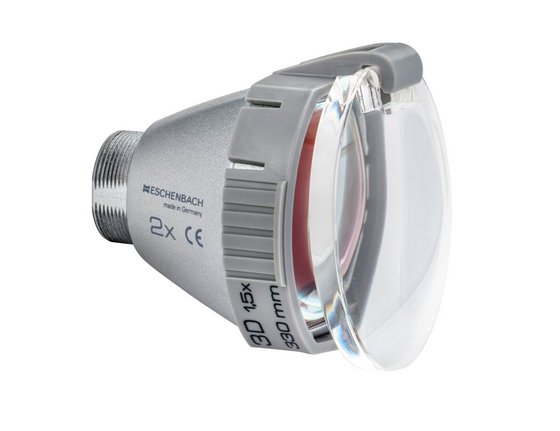Telescopes and monoculars
Galilei 2,0 GF
Art. Nr. 1623+16235
Product Benefits
- Large visual field, ideal for fluent reading.
- Also suitable for watching television.
- Lightweight therefore very comfortable to use!
- Particularly scratch-proof lens with high visual comfort.
- Not affected by age-related shaking due to low system magnification and large visual field.
Product Properties
- The Galilean systems Galilei 2.0 GF, Galilei 2.2x and Galilei 2.5x are mounted on the system carrier frame for use.
- The Galilei systems are installed using the adapter system Item No. 1625
- The Galilean system is set at infinity, reading caps are used for reading (see table).
- Ocular and objective lenses have a high-quality, anti-reflection hard coating.
- Diffractive aspheric PXM® lightweight lens, cera-tec® coated for a distortion-free image with edge-to-edge sharpness.
Product Accessories
Reading caps:
- 162301 Reading cap ring for fitting lens with an individual power (not shown).
- 16230 Frosted lens
- 16233 Reading cap 3.0 dpt
- 16234 Reading cap 4.0 dpt
- 16235 Reading cap 5.0 dpt
- 16236 Reading cap 6.0 dpt
- 16238 Reading cap 8.0 dpt
- 162310 Reading cap 10.0 dpt
- 162312 Reading cap 12.0 dpt
- Reading caps are easy to use: they can simply be flipped up out of the way without being removed.
- The reading caps 3 dpt/ 4 dpt/ 5 dpt are also suitable for binocular use when used with the corresponding convergence adapter.
Fitting case
- Item No. 1630
- The contents of the fitting case will enable you to test most of the adjustments for close range and distance which this system allows.
- Contents: 2 x 1623 with trial frame adapters,1 each of: 16230, 16233, 16234, 16235, 16236, 16238, 162310, 162312
Fitting instructions
- Item No. 162510
Technical data
| Working distance | 200 mm |
| Construction type | Galilei |
| Weight | 24.5 g |
| Field of view | 65 mm |
| Magnification Near | 2.5 x |
| Visual field near | 65 mm |
| Viewing angle near | 18.5 ° |
Materials
| manual_Galilei-System.pdf | 256 KB |
* The figures stated for visual field are average values. They will vary depending on the distance from the eye to the eyepiece.

